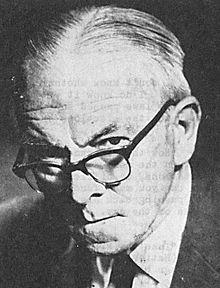Alan Paton
| Alan Paton | |
|---|---|

Alan Paton
|
|
| Born |
11 January 1903 Pietermaritzburg, Natal Province |
| Died | 12 April 1988 (aged 85) Durban, Natal |
| Occupation |
|
| Language | English |
| Notable works | Cry, the Beloved Country |
| Spouses |
Dorrie Francis Lusted 1928–67 Anne Hopkins 1969– |
Dorrie Francis Lusted 1928–67
Alan Stewart Paton (11 January 1903 – 12 April 1988) was a South African author and anti-apartheid activist.
Paton was born in Pietermaritzburg, Natal Province (now KwaZulu-Natal), the son of a minor civil servant. After attending Maritzburg College, he earned a Bachelor of Science degree at the University of Natal in his hometown, followed by a diploma in education. After graduation, Paton worked as a teacher, first at the Ixopo High School, and subsequently at Maritzburg College While at Ixopo he met Dorrie Francis Lusted. They were married in 1928 and remained together until her death from emphysema in 1967. Their life together is documented in Paton's book Kontakion for You Departed, published in 1969. They had two sons.
He served as the principal of Diepkloof Reformatory for young (black African) offenders from 1935 to 1949, where he introduced controversial "progressive" reforms, including policies on open dormitories, work permits, and home visitation. The men were initially housed in closed dormitories; once they had proven themselves trustworthy, they would be transferred to open dormitories within the compound. Men who showed great trustworthiness would be permitted to work outside the compound. In some cases, men were even permitted to reside outside the compound under the supervision of a care family. Fewer than 5% of the 10,000 men who were given home leave during Paton's years at Diepkloof ever broke their trust by failing to return.
Paton volunteered for service during World War II, but was refused. After the war he took a trip, at his own expense, to tour correctional facilities across the world. He toured Scandinavia, England, continental Europe, Canada, and the United States. During his time in Norway, he began work on his seminal novel Cry, The Beloved Country, which he completed over the course of his journey, finishing it on Christmas Eve in San Francisco in 1946. There, he met Aubrey and Marigold Burns, who read his manuscript and found a publisher: the editor Maxwell Perkins, noted for editing novels of Ernest Hemingway and Thomas Wolfe, guided Paton's first novel through publication with Scribner's.
...
Wikipedia
